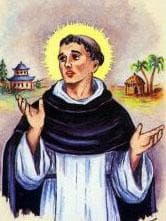
Blessed Humbert Of Romans
Blessed
Feast Day: July 14
Death: July 14, 1277
Biography
Blessed Humbert of Romans, also known as Humbert of Romans, was born in 1193 in Romans, Dauphiné, France. He was a renowned scholar and received his education in Paris, where he obtained a Doctorate in Civil Law.
In 1224, Humbert made a significant decision that would shape the course of his life. He joined the Order of Preachers, better known as the Dominicans. This religious order, founded by Saint Dominic, provided Humbert with a platform to serve God and his Church in a profound and impactful way.
Humbert's deep devotion and commitment to his faith led him to embark on a pilgrimage to the Holy Lands. Such journeys were seen as acts of faith and devotion in the Middle Ages, whereby individuals sought to deepen their spiritual connection with God by visiting the sites associated with Jesus and biblical events.
Returning from his pilgrimage, Humbert's leadership potential was recognized within his order, and he was appointed as the Provincial of the Dominican Roman province in 1240. This role allowed him to oversee the affairs of the Dominicans in Rome and ensure the effective functioning of the province.
Four years later, in 1244, Humbert was chosen as the Dominican provincial of France, a position of great responsibility and influence. During his time as provincial, he worked tirelessly to promote the Dominican order and its mission of preaching, teaching, and defending the Catholic faith.
Humbert's exceptional qualities of leadership and holiness became evident, and in 1254, he was inaugurated as the fifth Master-General of the Dominicans. In this capacity, he guided and governed the entire Dominican order, which had been rapidly expanding throughout Europe and beyond.
One of Humbert's notable achievements was his establishment and sponsorship of several successful foreign missions. He recognized the importance of spreading the Gospel to different cultures and lands, enabling the light of Christ to reach those who had not yet heard the Good News.
Additionally, Humbert played a vital role in supporting the education of fellow Dominicans. He understood the significance of intellectual formation in effectively carrying out the mission of the order. Through his efforts, numerous Dominicans were provided with opportunities for advanced studies, which enriched their preaching and teaching capacities.
Furthermore, Humbert played an instrumental role in approving the final revision of the Dominican Liturgy. The liturgy serves as the official public worship of the Dominican order, and Humbert's involvement ensured its authenticity and adherence to the traditions of the Church.
Despite his many accomplishments, Humbert eventually decided to step down from his position as Master-General in 1263. Seeking a life of solitude and contemplation, he retired to the priory of Valence, France. There, he dedicated himself to a life of prayer and reflection, seeking deeper intimacy with God.
However, even in his retirement, Humbert's wisdom and integrity were sought after. Pope Clement IV personally requested his assistance in settling a dispute among members of the Cistercian order. Despite his inclination towards solitude, Humbert answered the Pope's call, striving to bring about peace and reconciliation.
Blessed Humbert of Romans lived a life marked by his unwavering commitment to the Catholic faith and the Dominican order. His profound intellect, leadership skills, and dedication to the mission of preaching and teaching left an indelible impact on the Church. He died on 14 July 1277, at the priory of Valence in France, passing away peacefully from natural causes.
Although Humbert of Romans has not been officially venerated or beatified by the Catholic Church, his contributions and holiness continue to inspire countless individuals in their pursuit of God and the service of the Church. His feast day is celebrated on 14 July each year, honoring his life and legacy as a faithful Dominican and exemplary servant of God.